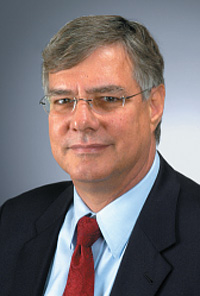BAS Transition Marks Important Milestones
by Michael Degitz
RESTON, VA. BAS transition activities continue to move along at a rapid clip. It's been a busy summer and early fall for everyone involved, and it isn't likely to slow down any time soon.
Broadcasters continue to work with Sprint Nextel, vendors, installers and manufacturers at a feverish pace to prepare for their market cutovers. Importantly, we are seeing this work pay off.
Washington, D.C., and Baltimore recently completed a successful transition. Washington is the second top-10 market to cut over and surpasses Houston as the largest to complete the transition. It has also been the most complex.

Michael Degitz Given the proximity of the two markets and since some of the Washington broadcasters share central receive site locations with Baltimore broadcasters, the transition had to be coordinated in both markets simultaneously. The transition included 21 licensees with more than 64 news trucks, six helicopters, 19 fixed links and 87 portable transmitter units. Yet, the cutover and testing went smoothly, and reports from the stations indicate they are very pleased with the new equipment.
A 'SUBSTANTIAL UNDERTAKING'
By the time you read this, it is likely that the final Mobile Satellite Service (MSS) priority markets have completed their transitions. Sprint and the broadcast community committed to accelerate the cutover of these markets to accommodate the MSS operators, and it has been a substantial undertaking—transitioning 26 markets that cover a combined population of more than 40 million people. The final MSS priority markets to transition include Greenville-Wash-ington-New Bern and Wilmington, N.C.; Charleston, Columbia and Florence-Myrtle Beach, S.C.; Austin, Harlingen-Brownsville-McAllen-Weslaco, and San Antonio, Texas and Salt Lake City.
Besides the sheer size and scope of these markets, this is also an important milestone because accommodating the MSS operators has had a significant impact on the rest of the country. Unfortunately, it has diverted resources from other scheduled markets, imposed greater costs and delayed the transition in some of the markets scheduled to transition this past summer. Now that the MSS markets are (or will soon be) finished, completing the previously scheduled markets will be the priority of all the transition participants.
Even with the diversion of resources to the MSS markets, we do continue to make progress in other markets. By the time you read this, another top-10 market and several other markets will have relocated (or soon will).
UNFORESEEN HURDLES
I am often asked why it's taking so long to complete the transition. Simply put, it was impossible for anyone to contemplate how difficult and complex it would be to complete the transition of more than 1,000 BAS systems. Keep in mind that in many cases these systems have been built over the course of 30 years using customized equipment. This is the case for the large markets like Washington, D.C., as well as the smaller markets.
Once we overcome the challenges inherent in each of the individual systems, scheduling a time to cut over a market can also be a logistical hurdle. Broadcasters rightfully must ensure that the transition does not conflict with scheduled events that they need to cover remotely like local sporting and community events. Also, the importance of "sweeps" periods precludes scheduling a transition during that time. These are the known variables; it is impossible to factor in weather. For instance, Hurricane Hannah hit the Carolinas while equipment was being delivered and installed.
Finally, as more and more broadcasters are working to complete preparations, other factors are impacting the speed of the market cutovers. The manufacturers are running at maximum capacity to build and ship equipment. They are working hard to meet the demanding schedule, but there is little room for error or delay.
Equipment installers are also struggling to keep up. There is a limited universe of qualified equipment installers and their ability to install the new equipment can be impacted by a wide-range of issues including weather, equipment availability and system configuration. Sometimes new or additional equipment must be ordered on an emergency basis, forcing installation crews to stop work and return later. The broadcasters themselves face multiple demands and limited time and resources as they are faced with not only the BAS transition, but also the DTV switch which is in and of itself a demanding project and is straining their limited staff and resources.
By outlining the difficulty of the task, I hope to pay tribute to the broadcasters all over the country who have risen to the challenge and successfully completed their transition. The continuing progress is a testament to the dedication and hard work of everyone involved. It is also serves as a reminder to the broadcasters in the markets just now starting the process that with the proper planning and lots of testing their transition can also be a success.
For additional information on the 2GHz BAS relocation go to www.2GHzRelocation.com
Michael Degitz is vice president of Global Development and Spectrum Management for Sprint Nextel
Get the TV Tech Newsletter
The professional video industry's #1 source for news, trends and product and tech information. Sign up below.
